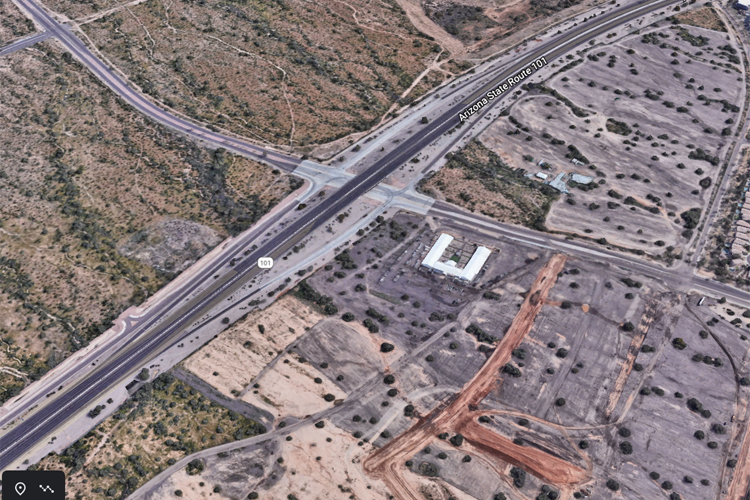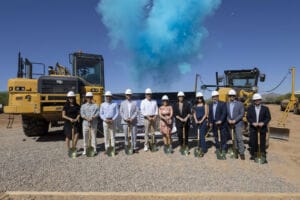The 9.2 million acres of Arizona State Trust land is one of the largest in the nation, and was created to generate revenue for 13 beneficiaries, particularly K-12 schools.
Last week, the heads of the Arizona State Land Department updated the real estate community about how the agency is leveraging the real estate boom to carry out that mission.
READ ALSO: Here’s the outlook for land and housing in 2021
“In recent years, the Arizona State Land Department has executed high profile deals across the Valley, resulting in billions of dollars of investment and new job opportunities for Arizonans,” said Cheryl Lombard, president and CEO of Valley Partnership, the voice of the real estate community in metro Phoenix, which hosted the event.
“The department is a critical tool for economic development in the state and for funding important state programs.”
Land department taking more business-minded approach
Arizona State Land Commissioner Lisa Atkins spoke at the event about the agency’s constitutional role and challenges. Unlike public land, any use or sale of trust property must be used solely to generate revenue for its beneficiaries.

About 90 percent of the land is leased by ranchers and farmers who provide a steady revenue stream for the beneficiaries, Atkins said. Encouraging economic growth also is part of the mission.
In recent years, the department has taken a more “business-like” approach in managing the huge land trust, including strategic auctioning of parcels to stimulate development to produce economic benefit for the beneficiaries and citizens, she said.
“The governor has been very specific that the agency serve customers and the state of Arizona in a more business-like fashion,” Atkins said. “So, every time we take a look at trust assets, we look at how it can be a part of the state’s economy.”
Since Ducey took office in 2015, the agency has held 59 successful auctions, she said. Last year alone, total receipts from state land department leases, fees and auction sales were $205.1 million.
Promoting economic development through zoning banks
As part of its mission to promote tax-generating development, the agency has been teaming up with communities to create “zoning banks.” These allow cities to annex state trust land for particular uses to attract more bidders and cut the timeline for successful buyers to go from auction to shovel in ground, Atkins said.
Cities like Phoenix, Peoria, Tucson, Scottsdale, Queen Creek, and the town of Eager in northeast Arizona have used zoning banks as economic development tools, she said.
Arizona State Trust land deals reap revenues for beneficiaries
Jim Perry, the deputy land commissioner, also spoke at the event about how the agency has been taking advantage of the robust real estate market to create economic development and new jobs.

Perry detailed some of the recent high profile auctions that are reaping rewards for the beneficiaries include:
• Homebuilder D.R. Horton won a highly sought after 270 acres near Elliot and Meridian roads that is to be annexed by Apache Junction. The land was appraised at $68 million and attracted 118 bids. Horton won the winning bid — $245.5 — more than three times the appraisal amount.
• D.R. Horton also was the winning bidder in the successful auction of 269 acres north of Desert Ridge near 56th Street and Deer Valley Parkway in an area known as Rawhide Wash. The home builder purchased the property for $79 million.
• Taiwan Semiconductor Manufacturing Company, the world’s largest contract chipmaker, purchased 1,100 acres of land in the Northwest Valley north of Glendale near the I-17 freeway and Loop 303 known as Biscuit Flats for a manufacturing facility. The property is adjacent to a 3,500 zoning bank targeted mostly for housing.
• Axon Enterprise, Inc., a law enforcement and military technology company headquartered in Scottsdale, was the successful bidder of 73.5 acres of land near Hayden Road and Loop 101 in Scottsdale. Axon submitted the winning bid of $49.1 million for the property for a new state-of-the art headquarters.
Upcoming auctions
Perry also mentioned several upcoming auctions including:
• A 370-acre parcel in Ahwatukee along Chandler Blvd. has been appraised at $105 million.
• Much needed housing in Tucson is the focus of 184 acres near Valencia and Houghton roads in Tucson. It is appraised at $14.5 million.
• A mountainous 417 acres near Jomax Road and Cave Creek roads targeted for residential use is appraised at $83 million.
• A total 162 acres for industrial development near Warner Road and the 202 freeway is awaiting appraisal.
• About 50 acres near 64th Street and Mayo Blvd. The appraisal is pending.
Every acre has a beneficiary
State trust land was granted to Arizona by the federal government in preparation for statehood in 1912. Arizona is one of 21 states that manage a total 500 million acres.
Every acre is held in trust and managed by the Land Department for the sole purpose of generating revenues for 13 beneficiaries. Beneficiaries receive designated payments generated from the sale of trust property, interest on the property loans, leases and fees.
Arizona’s K-12 schools are the top beneficiary, receiving about 80 to 85 percent of monetary benefits from the sale and lease of trust parcels. Approximately 8 million acres of trust property is designated for K-12 public education.
Other beneficiaries are the state’s three public universities, the Arizona School for the Deaf and the Blind; the state legislative, executive and judicial buildings; the Arizona State Hospital in Phoenix; the Arizona Pioneers’ Home in Prescott; the Arizona Department of Juvenile Corrections; and the Arizona Department of Corrections.
“That’s why we all get up and come to work —to help our beneficiaries. Our mission is number one to us,” Perry said.
To read more about the agency, visit: Arizona State Land Department
To view upcoming auctions of state land, visit: Upcoming auctions
This story was originally published at Chamber Business News.




